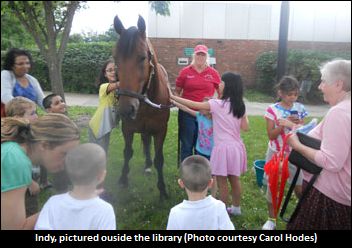Dozens of youngsters entering the Monmouth County Library in Manalapan, New Jersey on Monday, June 17 to check out a book also could check out a retired standardbred racehorse named Independent Act -- AKA, ‘Indy.’
A mellow 12-year-old trotter by Conway Hall, Indy was happy to gently suck up carrots from hands large and small, pose for dozens of photos and barely turned a hair during a thunderstorm.
 Indy and his owner, Suzanne D’Ambrose, spent nearly two hours at the library on Symmes Drive to help celebrate New Jersey’s Month of the Horse. The 1,100-pound horse stood patiently under an overhang at the library entrance when it rained. Otherwise, he happily munched on clover on the library’s front lawn.
Indy and his owner, Suzanne D’Ambrose, spent nearly two hours at the library on Symmes Drive to help celebrate New Jersey’s Month of the Horse. The 1,100-pound horse stood patiently under an overhang at the library entrance when it rained. Otherwise, he happily munched on clover on the library’s front lawn.
Colouring books provided by the United States Trotting Association were also a big hit.
Indy’s appearance as a Goodwill Ambassador for harness racing was held in conjunction with a panel discussion on the standardbred in Monmouth County, hosted by the library.
Tom Luchento, president of the Standardbred Breeders & Owners Association of New Jersey, was on the panel along with Harriet Honigfeld, administrator of the Farmland Preservation Program, Monmouth County Planning Board; owner-breeder-attorney Sam Landy, president of the Open Space Pace & Festival, and Dr. Karyn Malinowski, director of the Equine Science Center at Rutgers University. Moderating the panel was Dr. William Sciarappa of Rutgers University, New Jersey Agricultural Experiment Station.
Other speakers included Monmouth County Freeholder Lillian Burry and Millstone Township Mayor Nancy Grbelja.
Much of the discussion focused on the economic and environmental impact of the decline of the equine industry in New Jersey. Without a healthy racehorse industry in the state, not only will significant parcels of farmland be paved and developed but industries that support horses --- feed suppliers, veterinarians, farriers and others --- will depart the state.
“The state worries about attracting businesses that will employ a few hundred people but what about the 13,000 jobs in the equine industry?” Luchento noted. “These are people who work with their hands. They are not likely to find other jobs. They will go from being individuals with benefits and pensions to those who will need to be supported by the state. It makes no sense. We are not asking the state to give us something other than the opportunity to be on an equal footing with the other states in our region.”
Dr. Malinowski reminded the audience that all sectors of the equine industry represent an economic impact of $1.1-billion, making it one of the top sectors in the state’s economy. Of the 800,000 acres in the state that is still in agriculture, more than 25 per cent supports horses.
Indy, a 12-year-old trotter who retired from racing six years ago with eight wins and 16 in-the-money finishes, has earned many awards for hunter, pace, western showmanship as well as appeared in parades and made personal appearances.
(SBOANJ)

